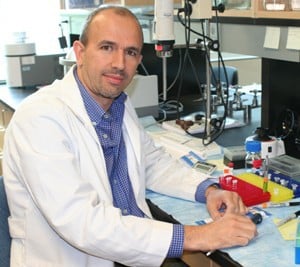Vitamin C Important for Healthy Bones, Says UAMS Researcher
|
June 7, 2010 | Vitamin C is as critical to healthy bones as vitamin D and calcium, reported a team of researchers that includes a University of Arkansas for Medical Sciences (UAMS) scientist. Also known as ascorbate, the nutrient is a factor in regulating development of and maintaining bone mass, the researchers reported in an article published online April 21 by the Journal of Biological Chemistry. The research team from Baylor College of Medicine and Lexicon Pharmaceuticals included Roy Morello, Ph.D., an assistant professor in the Department of Physiology and Biophysics in the UAMS College of Medicine. Morello noted that Vitamin D and calcium are two nutrients closely linked to strong bones but Vitamin C also plays a role. Previous studies including the Framingham Osteoporosis Study have shown that people with more Vitamin C in their diets had higher bone mass and fewer broken bones. In the latest work, researchers found that Vitamin C performed a dual function in mouse models, supporting new bone formation and suppressing bone resorption. The next step, Morello said, will be to seek a better understanding of that process. Finding exactly how Vitamin C impacts the bone lifecycle could have implications for treatment of bone diseases such as osteoporosis. “The research demonstrated the critical role that Vitamin C plays in bone health,” Morello said. “We believe a good part of the population is not getting enough Vitamin C and this work could lead the way to an increased role for Vitamin C in treating osteoporosis.” Mice make their own Vitamin C, something humans cannot do. Mouse models developed in this study focused on two enzymes – aldehyde reductase and aldose reductase – that account for Vitamin C synthesis. When both enzymes are not present the mice are unable to make Vitamin C and develop scurvy, a disease that affects the bones and other organs. When only the aldose reductase enzyme was present, the mice grew normally but could not handle a pregnancy or the loss of sex hormones without developing severe osteoporosis. A loss of sex hormones tied to menopause or aging has been identified as a risk factor for development of osteoporosis in humans and a higher dietary intake of Vitamin C can have protective effects. Others who took part in this work include: Kenneth H. Gabbay, Kurt M. Bohren and Terry Bertin, all of BCM and Jeff Liu and Peter Vogel of Lexicon Pharmaceuticals in the Woodlands. |
